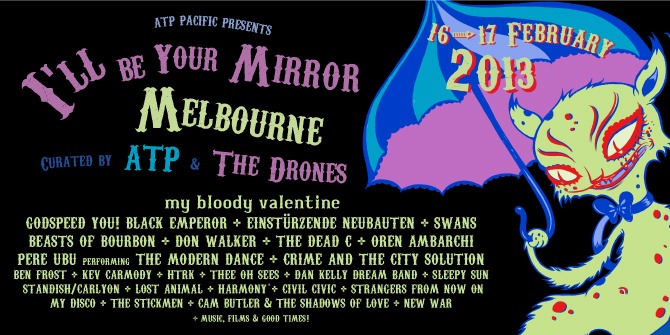Crime and the City Solution - Simon Bonney
Questions: Stuart Millen
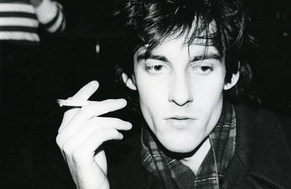
Crime and the City Solution are back after twenty years! The band, formed in Sydney in late 1997, spent time in Melbourne, London and Berlin, releasing four studio albums, before disbanding in 1991. Simon Bonney, lead singer and only constant member, relocated to the US, experiencing what normal life had to offer. He released two solo albums in the mid 90s, both influenced by his new home. Late 2011 saw Bonney resurrect Crime, now based in Detroit, for a new album and world tour.
Crime will be playing All Tomorrow’s Parties’ I’ll Be Your Mirror festival in Melbourne this month, as well as three intimate solo shows in Melbourne, Sydney and Brisbane. Simon spoke to Caught in the Mosh about the future and reminisced about the past.
You're calling from Melbourne yet Crimes is “based” in Detroit. Where’s home these days?
Well, last year I moved around quite a lot. We have chosen Detroit as the home of the band as the band lives all over the world. So from a band perspective, that is home. That’s where we record, that’s where we rehearse. That’s where we meet. But most of the band tend to live a pretty nomadic life.
How does this nomadic lifestyle affect Crime’s writing and recording?
Outlook is the way (laughs)! Outlook and people’s various calendars. The internet and garage band. We wrote all of the last album over the internet. We then got together to rehearse and record it, but it was fundamentally written from shared files on the internet. Which is one of the benefits of the digital ages.
How did that process, the fact that you weren’t physically together, influence the music that you wrote? Did it change the sound you created?
I think it definitely did. I got to spend more time with the song structures and the melodies than I had in the past. In the past, Alex or Mick would write something, we’d play it through, I’d put some vocals over the top of it, and that would be how we’d write a Crime song. Whereas now, if people send me a file, I can listen to it anywhere; as I’m running, on my computer, on my iPod. I can meander, ponder. I can put it together in my own time. I can record various ideas directly onto the tape, whereas the closest I came to that in the old days was people sent me a four-track, at a not insignificant expense. We’d set up a recording section, which involved third party people coming in and operating tape machines. Whereas now I can do it all myself. So yeah, it leads to more... it’s more synced to the music than perhaps it would’ve been in the previous incarnations.
You uploaded a few unreleased solo tracks to your Myspace page in 2010. Given this and your new writing process, how do you see the rise of the internet and digital music in the future of the music industry?
I think the music industry has change immensely. It’s unrecognisable. I’m not a business executive in that world, but it seems that there’s been a cultural shift. There’s an expectation of people who’ve grown up with the internet, that you don’t have to pay for music. And that’s the down side. The positive side is that I can get an email from someone who knew me when I was five, because they can find my name on an internet site, and they can tell me an interesting story about walking home with me from a period I can’t remember. Or I can contact David Eugene Edwards because I read an online article about him and I think he’s interesting and I like his music and he’s not too hard to track down and he ends up playing in a new version of Crime. Purely through contact over the internet.
In some ways, it benefits me, as long as I’m not reliant on music. It’s a complete plus as long as you’re not reliant on making a living through music. If your sole aim is to get your art out to as many people as possible, but not measuring that just in terms of sales, but physically getting it out to people, so that they can have access to listen to whatever it is you create, then the internet is fantastic. It’s just a problem when no income comes in. When you can’t live off it. Then it becomes difficult to record, because the recording costs are quite high. If it doesn’t recoup the costs, then it becomes quite difficult.
But from my own perspective, the internet is more positive than it is negative. Because people that may have a curiosity about Crime now have no barrier to find out about us, or listen to us, or view us on any one of hundreds of different platforms. You know, if someone had a question regarding how Crimes sounded, these days they don’t have to rely on some highly regarded music journalist saying what you’ve done is really good, to convince them to go down the shop, request the record, put it on the turntable, and listen to it in the listening booth. You just don’t have to do that any more.
Crime will be playing All Tomorrow’s Parties’ I’ll Be Your Mirror festival in Melbourne this month, as well as three intimate solo shows in Melbourne, Sydney and Brisbane. Simon spoke to Caught in the Mosh about the future and reminisced about the past.
You're calling from Melbourne yet Crimes is “based” in Detroit. Where’s home these days?
Well, last year I moved around quite a lot. We have chosen Detroit as the home of the band as the band lives all over the world. So from a band perspective, that is home. That’s where we record, that’s where we rehearse. That’s where we meet. But most of the band tend to live a pretty nomadic life.
How does this nomadic lifestyle affect Crime’s writing and recording?
Outlook is the way (laughs)! Outlook and people’s various calendars. The internet and garage band. We wrote all of the last album over the internet. We then got together to rehearse and record it, but it was fundamentally written from shared files on the internet. Which is one of the benefits of the digital ages.
How did that process, the fact that you weren’t physically together, influence the music that you wrote? Did it change the sound you created?
I think it definitely did. I got to spend more time with the song structures and the melodies than I had in the past. In the past, Alex or Mick would write something, we’d play it through, I’d put some vocals over the top of it, and that would be how we’d write a Crime song. Whereas now, if people send me a file, I can listen to it anywhere; as I’m running, on my computer, on my iPod. I can meander, ponder. I can put it together in my own time. I can record various ideas directly onto the tape, whereas the closest I came to that in the old days was people sent me a four-track, at a not insignificant expense. We’d set up a recording section, which involved third party people coming in and operating tape machines. Whereas now I can do it all myself. So yeah, it leads to more... it’s more synced to the music than perhaps it would’ve been in the previous incarnations.
You uploaded a few unreleased solo tracks to your Myspace page in 2010. Given this and your new writing process, how do you see the rise of the internet and digital music in the future of the music industry?
I think the music industry has change immensely. It’s unrecognisable. I’m not a business executive in that world, but it seems that there’s been a cultural shift. There’s an expectation of people who’ve grown up with the internet, that you don’t have to pay for music. And that’s the down side. The positive side is that I can get an email from someone who knew me when I was five, because they can find my name on an internet site, and they can tell me an interesting story about walking home with me from a period I can’t remember. Or I can contact David Eugene Edwards because I read an online article about him and I think he’s interesting and I like his music and he’s not too hard to track down and he ends up playing in a new version of Crime. Purely through contact over the internet.
In some ways, it benefits me, as long as I’m not reliant on music. It’s a complete plus as long as you’re not reliant on making a living through music. If your sole aim is to get your art out to as many people as possible, but not measuring that just in terms of sales, but physically getting it out to people, so that they can have access to listen to whatever it is you create, then the internet is fantastic. It’s just a problem when no income comes in. When you can’t live off it. Then it becomes difficult to record, because the recording costs are quite high. If it doesn’t recoup the costs, then it becomes quite difficult.
But from my own perspective, the internet is more positive than it is negative. Because people that may have a curiosity about Crime now have no barrier to find out about us, or listen to us, or view us on any one of hundreds of different platforms. You know, if someone had a question regarding how Crimes sounded, these days they don’t have to rely on some highly regarded music journalist saying what you’ve done is really good, to convince them to go down the shop, request the record, put it on the turntable, and listen to it in the listening booth. You just don’t have to do that any more.
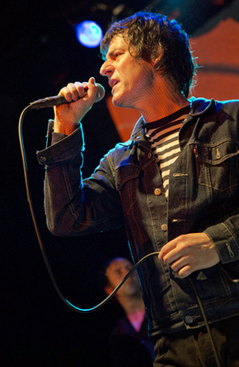
You’re heading back to Australia to play ATP’s I’ll Be Your Mirror Melbourne next month. It’s been a long time since you’ve played there. Are you looking forward to playing in Melbourne again?
Yes, it’s been twenty plus years. Yeah, look, one of the things that has changed since I last played is things like these festivals, like ATP. It’s made it financially viable for us to actually come out. They’re a great development since I last wandered around playing music. I’ve always wanted to come to Australia. I wanted to come to Australia once a year (laughs). But other than the one time when Crime was a predominantly Australian band, in fact it was all Australian except for one person, like the London Crime, when everyone had a place to stay when they were here, and they all had a desire to come home... When the band’s make up changed, and there were only three of us who were Australian, the overheads, accommodation etc, were just too prohibitive. We never got out here.
Looking forward to playing ATP? Absolutely. I love playing on the bigger stages because it suits us now that we’re an 8-piece band and that we have a visually orientated live show with big background projections, which is an integral part of the show. Those kinds of festivals, particularly the indoor festivals, really suit Crime. Crime and the City Solution is not the sort of band you want to see in a coffee bar. It just defeats then purpose of what we’re about.
What are your memories of the music scene in Sydney and Melbourne from those early days of Crime?
Wow. Good question... Sydney was... Difficult for us. There was no... We didn’t really feel a kinship with any of the other bands in Sydney at the time. We never really found that niche, where we felt particularly supported. So when we met Rowland and Ollie from the Young Charlatans when they came to visit Sydney, then later on the Boys Next Door and various other Melbourne bands, there was that kind of... Camaraderie, I guess you’d call it. There were no rules, there were no expectations, because there was no history, really, of Australian bands, certainly not like us, going overseas and being successful. Well, the Saints had gone over and they had success. But it was still such a rarity. You didn’t play music with the kind of... No one got into music with the idea of “hey, I’m going to get into music because I can make a lot of money and record a lot of records”. The idea of recording a record just seemed to be a distant thought. I don’t think I could even put it as high as an aspiration. It was just wasn’t something that was thought about. You didn’t feel any pressure to be anything more than you wanted to be. There was no pressure to be part of any scene, or to conform to any particular idea of what music was meant to sound like. Or what the NME said was the newest and most in-fashion sound. There weren’t any of those pressures. You were able to grown in darkness, as it were, without the harsh spotlight of the media picking at the carcass. So yeah, I remember it quite fondly (laughs).
Your recent live shows have included tracks from all the past Crime releases. Are there old tracks that you’re especially enjoying playing again?
Well, look, we didn’t really... There’s no one in the band, other than myself, who played on Six Bells Chime or Rose Blue, but we’ve had a lot of fun playing them now. It seemed like the right thing to do. And it was. It was enjoyable. That’s about all I can say.
Yes, it’s been twenty plus years. Yeah, look, one of the things that has changed since I last played is things like these festivals, like ATP. It’s made it financially viable for us to actually come out. They’re a great development since I last wandered around playing music. I’ve always wanted to come to Australia. I wanted to come to Australia once a year (laughs). But other than the one time when Crime was a predominantly Australian band, in fact it was all Australian except for one person, like the London Crime, when everyone had a place to stay when they were here, and they all had a desire to come home... When the band’s make up changed, and there were only three of us who were Australian, the overheads, accommodation etc, were just too prohibitive. We never got out here.
Looking forward to playing ATP? Absolutely. I love playing on the bigger stages because it suits us now that we’re an 8-piece band and that we have a visually orientated live show with big background projections, which is an integral part of the show. Those kinds of festivals, particularly the indoor festivals, really suit Crime. Crime and the City Solution is not the sort of band you want to see in a coffee bar. It just defeats then purpose of what we’re about.
What are your memories of the music scene in Sydney and Melbourne from those early days of Crime?
Wow. Good question... Sydney was... Difficult for us. There was no... We didn’t really feel a kinship with any of the other bands in Sydney at the time. We never really found that niche, where we felt particularly supported. So when we met Rowland and Ollie from the Young Charlatans when they came to visit Sydney, then later on the Boys Next Door and various other Melbourne bands, there was that kind of... Camaraderie, I guess you’d call it. There were no rules, there were no expectations, because there was no history, really, of Australian bands, certainly not like us, going overseas and being successful. Well, the Saints had gone over and they had success. But it was still such a rarity. You didn’t play music with the kind of... No one got into music with the idea of “hey, I’m going to get into music because I can make a lot of money and record a lot of records”. The idea of recording a record just seemed to be a distant thought. I don’t think I could even put it as high as an aspiration. It was just wasn’t something that was thought about. You didn’t feel any pressure to be anything more than you wanted to be. There was no pressure to be part of any scene, or to conform to any particular idea of what music was meant to sound like. Or what the NME said was the newest and most in-fashion sound. There weren’t any of those pressures. You were able to grown in darkness, as it were, without the harsh spotlight of the media picking at the carcass. So yeah, I remember it quite fondly (laughs).
Your recent live shows have included tracks from all the past Crime releases. Are there old tracks that you’re especially enjoying playing again?
Well, look, we didn’t really... There’s no one in the band, other than myself, who played on Six Bells Chime or Rose Blue, but we’ve had a lot of fun playing them now. It seemed like the right thing to do. And it was. It was enjoyable. That’s about all I can say.
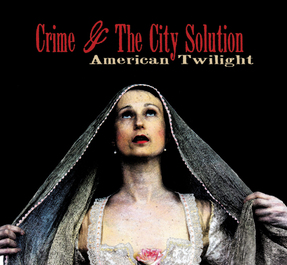
Your shows have also previewed a few tracks from the forthcoming American Twilight release. How’s the reaction to the new songs been?
They’ve been going down really well. We’ve played the Colonel Doesn’t Call Any More and we’ve played the title track, American Twilight, which is the last track for the encore we tended to do, and that just ended up in barely controlled chaos towards the end. And that was great fun. And we’ll probably introduce 2-3 more to the current set when we play ATP.
It must be heartening to know that the new songs are being well received. Hopefully the rest of the new album should have a similar reaction.
Yeah, everything’s gone well. You know, a lot of stuff was unknown. We didn’t know what it was going to be like when we got back together. People change. They go off in different directions. It was a complete unknown. But things clicked so quickly and so completely, that it was a real pleasure making the new record. And the audience... 50% have seen us when we were around last time, 50% probably weren’t even born then (laughs). You know, it was really interesting talking to the young people at the shows, hearing how they saw us, what it was that resonated with them. And in some ways, like lyrically, it seems that our music is as relevant now as it was in the 80s. Certainly there’s a lot of anxiety and real angst in the state of the world in the US. So many people are in such precarious personal positions as far as work and the future and whether their pension funds are going to tank and all that. And in that, people are really looking for someone to give voice to those anxieties. A lot of people who spoke to us after the shows were struggling but they wanted to, they needed to come and see us. Many coming long distances. And that was really gratifying. It was interesting talking to people who started listening to us when they were 15-16 years old. It made me feel very paternal (laughs).
You spent the initial time with Crime based in Sydney and Melbourne before relocating to London then Berlin, then time as a solo performer in Los Angeles and you’re now in Detroit. Does your physical location and/or environment influence your writing?
Yes, always. The things I’m interested in don’t change, but the way I populate the songs, the characters in them, they’re heavily dependent on the environment I’m in. When I wrote the Last Dictator, I was interested in the power within nation states, in higher levels of government. Which I think is quite similar to the relationships in families. There are similar power relationships. But being that I was in Vienna when I wrote it, I set it against... Two things that influence the way I write, two things I’m interested in, are power and corruption. What power does to people is a common theme in my work. The things that influence me are what I’m reading and watching and where I’m living, much more than what I’m listening to. So in Vienna, I was in an old apartment, in the western-most quarter where the Ottomans reached. I used to go to the Volks Museum every day, because I liked the coffee shop there. So I was influenced by very grand paintings. All of those things fed into the imagery that became the Last Dictator.
They’ve been going down really well. We’ve played the Colonel Doesn’t Call Any More and we’ve played the title track, American Twilight, which is the last track for the encore we tended to do, and that just ended up in barely controlled chaos towards the end. And that was great fun. And we’ll probably introduce 2-3 more to the current set when we play ATP.
It must be heartening to know that the new songs are being well received. Hopefully the rest of the new album should have a similar reaction.
Yeah, everything’s gone well. You know, a lot of stuff was unknown. We didn’t know what it was going to be like when we got back together. People change. They go off in different directions. It was a complete unknown. But things clicked so quickly and so completely, that it was a real pleasure making the new record. And the audience... 50% have seen us when we were around last time, 50% probably weren’t even born then (laughs). You know, it was really interesting talking to the young people at the shows, hearing how they saw us, what it was that resonated with them. And in some ways, like lyrically, it seems that our music is as relevant now as it was in the 80s. Certainly there’s a lot of anxiety and real angst in the state of the world in the US. So many people are in such precarious personal positions as far as work and the future and whether their pension funds are going to tank and all that. And in that, people are really looking for someone to give voice to those anxieties. A lot of people who spoke to us after the shows were struggling but they wanted to, they needed to come and see us. Many coming long distances. And that was really gratifying. It was interesting talking to people who started listening to us when they were 15-16 years old. It made me feel very paternal (laughs).
You spent the initial time with Crime based in Sydney and Melbourne before relocating to London then Berlin, then time as a solo performer in Los Angeles and you’re now in Detroit. Does your physical location and/or environment influence your writing?
Yes, always. The things I’m interested in don’t change, but the way I populate the songs, the characters in them, they’re heavily dependent on the environment I’m in. When I wrote the Last Dictator, I was interested in the power within nation states, in higher levels of government. Which I think is quite similar to the relationships in families. There are similar power relationships. But being that I was in Vienna when I wrote it, I set it against... Two things that influence the way I write, two things I’m interested in, are power and corruption. What power does to people is a common theme in my work. The things that influence me are what I’m reading and watching and where I’m living, much more than what I’m listening to. So in Vienna, I was in an old apartment, in the western-most quarter where the Ottomans reached. I used to go to the Volks Museum every day, because I liked the coffee shop there. So I was influenced by very grand paintings. All of those things fed into the imagery that became the Last Dictator.
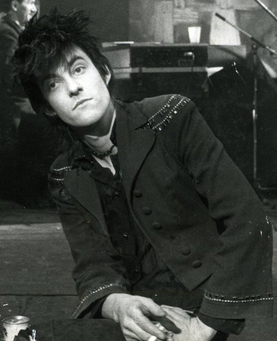
You were quite active while in Berlin. How do you see your time there?
For me, personally, that was the most productive period, next to this one. It was the right time for me. It was the right environment for me. And Alex was the right guitarist for me. So for me, that was just... Looking completely subjectively, like if people love the other stuff, that’s fantastic, I’m not going to take that away from anybody (laughs)... But for me, the most important and rewarding period was the Berlin period. Shine, the Bride Ship was a troubled kind of sophomore album (laughs), but I love the song the Bride Ship, and then Paradise Discotheque. So, to me, my three favourite records are Shine, Paradise Discotheque and this new one, American Twilight.
It was a strange kind of claustrophobic place, Berlin. At the time, you did feel the impact of being surrounded by that wall. It was very kind of separate bohemian community that was pretty self sufficient within larger Berlin, which was again an island itself within West Germany. So a satellite of West Germany in the middle of East Germany. So you kind of had these worlds within worlds within worlds. It was very separate. It kind of let you explore what music was and really go on your own journey. And I felt a lot of support in taking that journey in Berlin
I read an interview from a few years ago where you said you weren’t particularly interested in reforming the band if you couldn’t get the original members of the Berlin Crime involved. You have Bronwyn and Alex from the Berlin days, but also a swag of new friends. What made you decide now was the right to start Crime again?
I felt I had something to say. And I hadn’t for a while. I hadn’t felt any particularly strong desire to do anything musical. I had other things I was interested in doing. Music’s never been the only thin I’m interested in. So many musicians I meet, that’s the only thing... They’ve got to do it. And they’ve got to do it every day. And they’ve got to do if whether it makes them financially comfortable or makes them homeless. But I was never like that. It interests me and I love doing it when I do it but it’s not the only thing I’m interested in doing. This time, my children have matured. They were fluttering their wings, indicating they were ready to move off on their own journey. I had found stable employment, I finished half of my university course. It was just the right time. And fortunately, it ended up being the right time for everybody else too.
For me, personally, that was the most productive period, next to this one. It was the right time for me. It was the right environment for me. And Alex was the right guitarist for me. So for me, that was just... Looking completely subjectively, like if people love the other stuff, that’s fantastic, I’m not going to take that away from anybody (laughs)... But for me, the most important and rewarding period was the Berlin period. Shine, the Bride Ship was a troubled kind of sophomore album (laughs), but I love the song the Bride Ship, and then Paradise Discotheque. So, to me, my three favourite records are Shine, Paradise Discotheque and this new one, American Twilight.
It was a strange kind of claustrophobic place, Berlin. At the time, you did feel the impact of being surrounded by that wall. It was very kind of separate bohemian community that was pretty self sufficient within larger Berlin, which was again an island itself within West Germany. So a satellite of West Germany in the middle of East Germany. So you kind of had these worlds within worlds within worlds. It was very separate. It kind of let you explore what music was and really go on your own journey. And I felt a lot of support in taking that journey in Berlin
I read an interview from a few years ago where you said you weren’t particularly interested in reforming the band if you couldn’t get the original members of the Berlin Crime involved. You have Bronwyn and Alex from the Berlin days, but also a swag of new friends. What made you decide now was the right to start Crime again?
I felt I had something to say. And I hadn’t for a while. I hadn’t felt any particularly strong desire to do anything musical. I had other things I was interested in doing. Music’s never been the only thin I’m interested in. So many musicians I meet, that’s the only thing... They’ve got to do it. And they’ve got to do it every day. And they’ve got to do if whether it makes them financially comfortable or makes them homeless. But I was never like that. It interests me and I love doing it when I do it but it’s not the only thing I’m interested in doing. This time, my children have matured. They were fluttering their wings, indicating they were ready to move off on their own journey. I had found stable employment, I finished half of my university course. It was just the right time. And fortunately, it ended up being the right time for everybody else too.
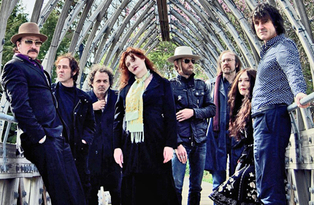
You’re playing with Einstürzende Neubauten at ATP. Have you had a chance to play with them before?
No. Because of Alex being in the band I think this will be... Look, maybe the first show we ever played we played with some elements of Einstürzende Neubauten. But no, I can’t think of any other time we have played with them.
So Alex is in Crimes and he’s still in Einstürzende Neubauten? Will he be playing with both bands at ATP?
Yes, he’s still with Einstürzende Neubauten. He’ll be playing with both Crimes and Neubauten, so he’ll be a busy man!
Are there any artists at ATP your particularly interested in catching live yourself?
Well, as I say, I’m definitely not an audiophile. I’m just don’t listen to that much music. Music isn’t really the primary influence when I’m making records. So my tastes tend to be pretty narrow and pretty old. I like a story. So if doesn’t have a story I’m probably not likely to listen to it. Sometimes I like a nice melody, a good voice. If someone can create a fantastic melodic pop song I’d be less inclined to listen to that than someone who wasn’t as good at creating a story, but nevertheless created some kind of mood. I was listening to Lana Del Rey’s Ride recently. I really like her voice and I know what kind of story she’s trying to tell and I like that story. And I listen to that and I find it interesting. But in general... Look, when they asked me to put together a set of songs for Spotify, I ended up with just Simple Man by Lynyrd Skynyrd and When the Music’s Over by the Doors. Nothing really current. But... ATP and the other festivals we’re likely to be playing over the next 12 moths will give me that opportunity to see bands I would otherwise not encounter, which is great.
Well, that’s one of the beautiful things about music festivals, isn’t it? You can discover bands you might not have heard in the past.
Yeah, absolutely!
No. Because of Alex being in the band I think this will be... Look, maybe the first show we ever played we played with some elements of Einstürzende Neubauten. But no, I can’t think of any other time we have played with them.
So Alex is in Crimes and he’s still in Einstürzende Neubauten? Will he be playing with both bands at ATP?
Yes, he’s still with Einstürzende Neubauten. He’ll be playing with both Crimes and Neubauten, so he’ll be a busy man!
Are there any artists at ATP your particularly interested in catching live yourself?
Well, as I say, I’m definitely not an audiophile. I’m just don’t listen to that much music. Music isn’t really the primary influence when I’m making records. So my tastes tend to be pretty narrow and pretty old. I like a story. So if doesn’t have a story I’m probably not likely to listen to it. Sometimes I like a nice melody, a good voice. If someone can create a fantastic melodic pop song I’d be less inclined to listen to that than someone who wasn’t as good at creating a story, but nevertheless created some kind of mood. I was listening to Lana Del Rey’s Ride recently. I really like her voice and I know what kind of story she’s trying to tell and I like that story. And I listen to that and I find it interesting. But in general... Look, when they asked me to put together a set of songs for Spotify, I ended up with just Simple Man by Lynyrd Skynyrd and When the Music’s Over by the Doors. Nothing really current. But... ATP and the other festivals we’re likely to be playing over the next 12 moths will give me that opportunity to see bands I would otherwise not encounter, which is great.
Well, that’s one of the beautiful things about music festivals, isn’t it? You can discover bands you might not have heard in the past.
Yeah, absolutely!
Crime and the City Solution 2013 Australian Tour
Tickets on sale now
Sun 17th Feb - Melbourne, Altona North (ATP's I'll Be Your Mirror) - tickets from All Tomorrow's Parties
Mon 18th Feb - Melbourne, the Hi-Fi - tickets from the Hi-Fi
Thu 21st Feb - Sydney, the Hi-Fi - tickets from the Hi-Fi
Sun 24th Feb - Brisbane, the Hi-Fi - tickets from the Hi-Fi

